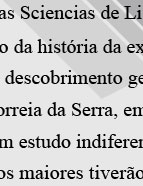

................................
Among his many works, his História das Ideias Republicanas em Portugal [History of Republican Ideas in Portugal], written in line with this approach, is particularly noteworthy. In the same vein, José de Arriaga (1848–1921) left valuable contributions on the Revolution of 1820, Setembrismo, and the final decades of the Constitutional Monarchy, as also Basílio Teles (1856–1923) who, among his many writings, left us Do Ultimatum ao 31 de Janeiro (Esboço de História Política) [From the Ultimatum to 31 January (Sketch of Political History)], also written in a tone politically committed to republicanism.
In a different political field, the historiography of Joaquim Pedro de Oliveira Martins (1845–1894) stands polemically against positivism and republicanism. It is based on a synthetic and a priori conception of history. Among valuable contributions, this eclectic thinker and political activist bequeathed us a new vision of the História de Portugal [History of Portugal] in several volumes, continued by another major work, Portugal Contemporâneo [Contemporary Portugal,] where history is presented in a narrative tone, especially as a “farce,” revealing a highly critical view of the kingdom’s evolution and the ruling elite of the 19th century, which may also be understood as a kind of “reckoning” between the author and his era, which never rewarded him with the importance Oliveira Martins deemed him to have.
This paradigm, oscillating between positivism and traditional political history, would encounter its existential crisis. The changes brought by "modernity" also affected the way history was thought. The rapid economic development imposed on industrialised societies and the consequent multiplication of social conflict eventually replaced the state as the main agent of historical change. At the same time, the advent of mass societies diminished the importance of the individual as the sole subject of history. The progress of the sciences in general, and of the social sciences in particular served to exacerbate the effects of this crisis.
